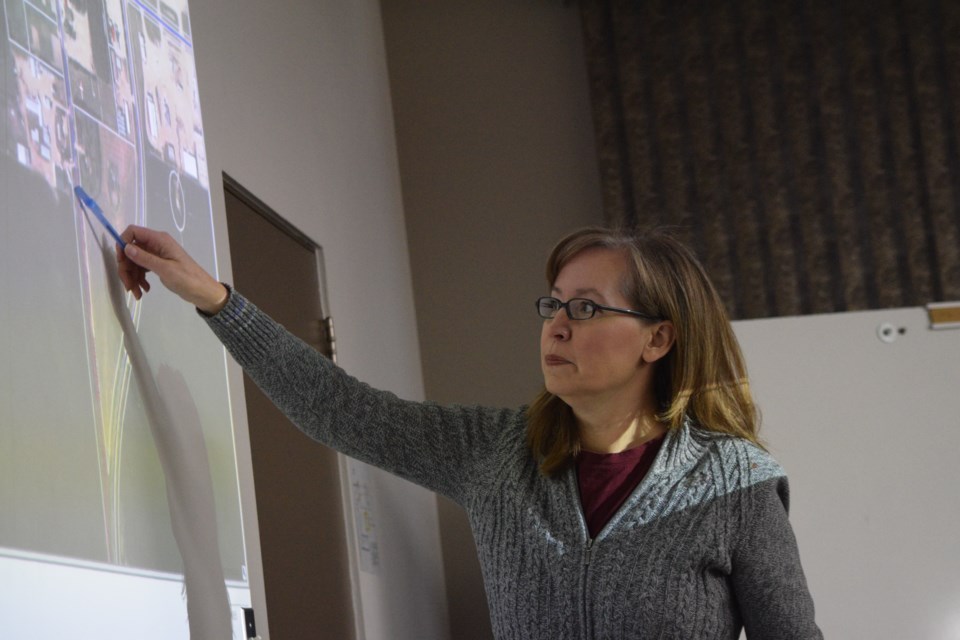BARRHEAD - The owners of a County of Barrhead property have taken the first step in approving using a former boathouse as a guest house under the municipality's newly minted Land-use Bylaw.
The Land-use Bylaw was approved in September.
On Nov. 19, the county's municipal planning commission (MPC) approved Corey, Marvin, and Roseann Pendrak's application for a lakefront 4.69-metre setback for an as-built Moonlight Bay boathouse. The MPC also approved a front setback of 7.70 feet but ordered the applicant to remove the front deck from the structure. The MPC also back-permitted back-permitted a cold storage building.
Development officer Jenny Bruns said the property was brought to the municipality's attention after the public filed a compliance complaint.
Alberta Environment and Protection is dealing with the complaint.
However, as the municipality discovered more about the property, they realized that additional improvements, including a deck and cold storage, had been made but not properly permitted.
"[Eventually, [the MPC] will see an application to be approved as a tourist accommodation, but first, we need to bring it into compliance," she said.
The property is in a residential recreation district, and guest homes are allowed as a discretionary use.
"Other guest houses are permitted in the area," she said.
Bruns noted that initially, the boathouse was permitted for storage; one issue is that the original owners of the property placed the boathouse in the wrong location, which meant it did not meet the municipality's five-foot side setback.
The current guest house has a 2.72-foot side setback, as a real property report (RPR) noted.
"We usually don't wiggle those because five feet makes better neighbours," she said.
Bruns noted the front deck additions also did not meet the required front setback to the municipal reserve and lakeshore, and although the cold storage building did meet the required setback, it wasn't permitted.
She said that the developer added a deck to the boathouse in the front without a permit and that even without the deck, the structure did not meet the 20-foot setback requirement from the lakefront property line.
Bruns said that, given this, the developer has stated that the deck could be shortened considerably, increasing the setback to about 7.7 feet.
"[Alberta Environment and Protection] has indicated their main consideration is to protect the bed and shore, and any potential setback should be increased to accommodate high water events," she said. "Because it is a deck, it's not as significant if it gets covered in water or is sloughed off, but we do have some liability when something is closer to the bed and shore," she said.
Bruns added that the MPC could grant variances if they feel the development would not unduly interfere with the neighbourhood's amenities or impact the use, enjoyment, or value of neighbouring properties and that it conforms with the use prescribed for that land or building under the Land-use Bylaw.
Coun. Bill Lane suggested the Pendraks move the guest house to meet the setbacks.
Bruns said that wasn't possible, as it is on a concrete slab. If the councillors did not grant at least some of the variances, the only solution would be to "take it down" and start afresh, adding that the boathouse was already in place when the Pendraks purchased the property.
Coun. Paul Properzi asked about the wastewater situation, referring to the septic system.
"Are the two properties sharing one septic system [between the main residence and the guest house] because it probably wouldn't be big enough," he said.
Bruns said she wasn't sure but speculated the structures had separate septic systems.
"We always refer all of our applications to [the Safety Codes Council], and they'll take a look at it," she said.
Reeve Doug Drozd questioned why the council or the MPC of the time did not flag the issues, noting that the RPR, dated 2012, identified them.
Burns said the municipality's process was different then.
"We would get the RPR, and [the development officer] would write a letter to the [developer] stating the municipality's setback requirements," she said. "Our process is more comprehensive now. We identify [whether a proposed development] meets our requirements, and we usually provide a recommendation. If there is an encroachment, we tell the developer it must be removed, working with the lawyers appropriately. But the buyer can always ignore our comments and do what they want."
Coun. Jared Stoik interjected that he feels they need to be diligent in adhering to municipal requirements and setbacks.
"This is a bit of a different case," he said. "He is not the one that put [the boathouse] in the wrong spot. So, this is a case where I'd be OK with granting some of the variances, but I don't want to lose focus that if people are putting things where they shouldn't, we need to tell them they need to take it down."
Drozd informed the council that the applicant had already been advertising and selling the accommodation on Airbnb for quite some time.
Coun. Walter Preugschas said one of the complaints or concerns the council has heard from opponents of tourism-type accommodations is that the owner does not live on site.
"In this case, the person is living there," he said.
County manager Debbie Oyarzun said that while that might be the case, under the municipality's new Land-use Bylaw council approved in late September, the owner living on site is not required.
Bruns noted that one regulation in the Land-use Bylaw is that an owner can only rent out one Airbnb accommodation on a property.
Barry Kerton, TownandCountryToday.com



